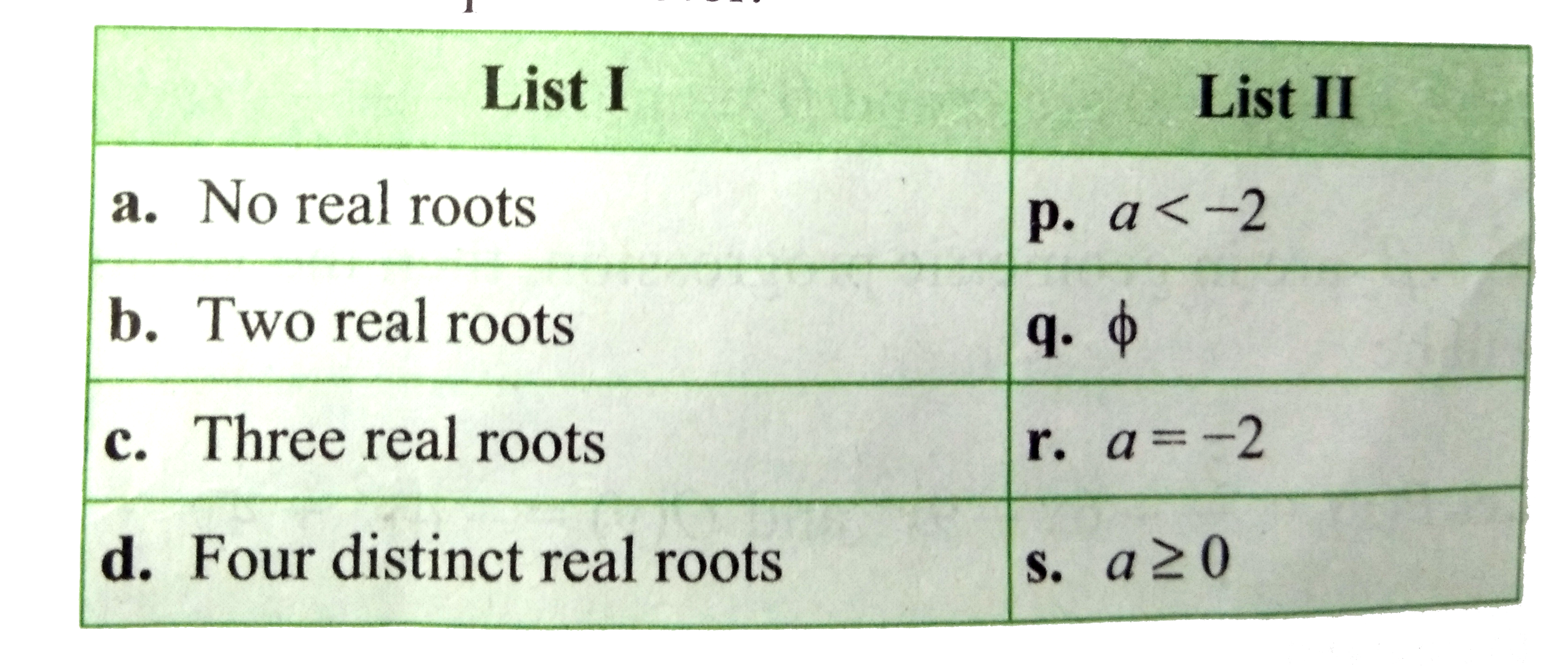If f(x)=ax2+bc+c , where a≠0,b,c∈ R , then which of
the following conditions implies that f(x) has real roots? Solution in Tamil
a+ b + c = 0
a and c are of opposite signs
4ac−b2<0
a and b are of opposite signs
The correct Answer is:1,2,3,
(1) If f(1)=0⇒a+b+c=0
so, roots are real.
(2) D=b2−4ac
If ac<0⇒b2−4ac>0
(3) 4ac−b2<0⇒b2−4ac>0
So, roota are real .
This is not the sufficients condition
Topper's Solved these Questions
- THEORY OF EQUATIONSBOOK - CENGAGECHAPTER - THEORY OF EQUATIONSEXERCISE - Exercise (Comprehension)
37 Videos
- THEORY OF EQUATIONSBOOK - CENGAGECHAPTER - THEORY OF EQUATIONSEXERCISE - Exercise (Matrix)
6 Videos
- THEORY OF EQUATIONSBOOK - CENGAGECHAPTER - THEORY OF EQUATIONSEXERCISE - Exercise (Single)
89 Videos
- STRAIGHT LINESBOOK - CENGAGECHAPTER - STRAIGHT LINESEXERCISE - JEE Advanced Previous Year
4 Videos
- THREE DIMENSIONAL GEOMETRYBOOK - CENGAGECHAPTER - THREE DIMENSIONAL GEOMETRYEXERCISE - Question Bank
12 Videos
Similar Questions
Consider an unknow polynomial which divided by (x−3) and (x−4) leaves remainder 2 and 1, respectively. Let R(x) be the remainder when this polynomial is divided by (x−3)(x−4).
If equations R(x)=x2+ax+1 has two distint real roots, then exhaustive values of a are.
View SolutionMatch the following for the equation x2+a|x|+1=0 where, a is a parameter.

View SolutionThe value of expression x4−8x3+18x2−8x+2 when x=2+√3
View Solutionabout to only mathematics
View SolutionThe equation of the plane which has the property that the point Q(5,4,5) is the reflection of point P(1,2,3) through that plane, is ax+by+cz=d where a,b,c,d∈N. Find the least value of (a+b+c+d).
View SolutionIf f(x)=ax2+bx+c,g(x)=−ax2+bx+c,whereac≠0, then prove that f(x)g(x)=0 has at least two real roots.
View SolutionLet f(x)=x^(2)+ax+b, where a,b in R. If f(x)=0 has all its roots imaginary then the roots of f(x)+f'(x)+f(x)=0 are
View SolutionLet f(x)=ax^(2)+bx+c, where a,b,c,in R and a!=0, If f(2)=3f(1) and 3 is a roots of the equation f(x)=0, then the other roots of f(x)=0 is
View SolutionConsider the quadratic function f(x)=ax^(2)+bx+c where a,b,c in R and a!=0, such that f(x)=f(2-x) for all real number x. The sum of the roots of f(x) is
View SolutionLet f(x)=ax2−bx+c2,b≠0andf(x)≠0 for all x∈R. Then
View SolutionIf f(x)=ax2+bc+c , where a≠0,b,c∈ R , then which of
the following conditions implies that f(x) has real roots?
View SolutionLet f(x)=ax2+bx+c,a>=andf(2−x)=f(2+x)∀x∈Randf(x)=0 has 2 distinct real roots, then which of the following is true ?
View SolutionLet f(x)=ax2+bx+c,a≠0, such the f(−1−x)=f(−1+x)∀x∈R. Also given that f(x)=0 has no real roots and 4a+b>0.
Let p=b−4a,q=2a+b, then pq is:
View SolutionLet f(x)=x2+ax+b, where a,b∈R. If f(x)=0 has all its roots imaginary, then the roots of f(x)+f'(x)+f''(x)=0 are
View SolutionIf f(x)=ax2+bx+c,g(x)=−ax2+bx+c ,where ac≠0, then prove that f(x)g(x)=0 has at least two real roots.
View SolutionLet f(x)=ax2−bx+c2,b≠0andf(x)≠0 for all x∈R. Then
View Solution
